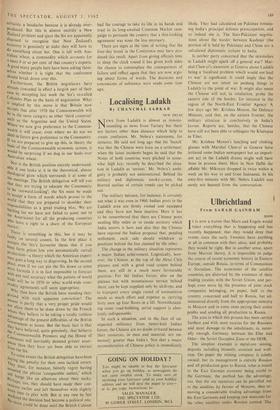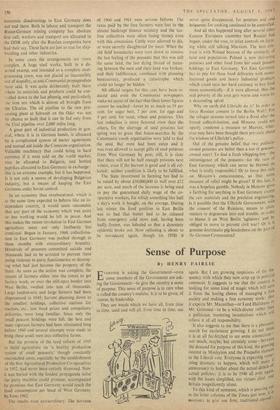Ulbrichtland $
From SARAH GAINHAM
BONN
TT is now a truism that Marx and Engels would 'reject everything that is happening and has recently happened; that they would deny that events since the early Twenties have anything at all in common with their ideas, and probably they would be right. But in another sense, apart from Marxist theory, it is impossible to judge the course of recent economic history in Eastern Europe, outside Russia, in terms of Communism oe Socialism. The economies of the satellite countries are distorted by the existence of their trading treaties with the Soviet Union, and per-. haps even more by the presence of joint stock companies belonging, on paper, half to the country concerned and half to Russia, but ad- ministered directly from the appropriate ministry in Mokow and in some cases paying their entire profits and sending all production to Russia.
The area in which this process has been carried furthest and with most success for the Russians and most damage to the inhabitants, is, natur- ally enough, Germany between the Elbe and Oder-the Soviet Occupied Zone or the DDR.
The simplest example is metal-ore mining, deposits including bismuth, uranium and wolf- ram. On -paper the mining company is jointly owned; but its management is entirely Russian and all production goes to Russia, what is issued to the East German economy being resold to the Germans; the method has the advantage, too, that the ore resources can be parcelled out to the satellites by favour of Moscow, thus re- moving a considerable trading advantage from the East Germans and keeping raw materials for the other satellites under Russian control. The economic disadvantage to East Germany does not end there. Both in labour and transport the Russo-German mining company has absolute first call; workers and transport are allocated to the DDR only after the Russian companies have had their say. These facts are just as true for ship- building and other industries.
In some cases the arrangements are more complex. A huge steel works, built in a de- serted swamp, and intended as a complete steel- processing town, was not placed so inaccessibly out of stupidity, as anti-Communist propagandists have said. It was quite deliberately built there where its materials and products could be con- trolled down to the last pfennig, and particularly :be iron ore which is almost all brought from the Ukraine. The oil pipeline to the new pro- cessing plant at Schwedt on the Oder was not by chance so built that it can be fed only from the Ural pipeline over 2,000 miles long.
A great part of industrial production in gen- eral, where it is in German hands, is allocated by a complicated system of barter agreements and mutual aid inside the Comecon organisation. Valuable machinery that could bring in hard currency if it were sold on the world market, may be allocated to Bulgaria, and bottled paprikas allocated to East Germany in exchange: this is an extreme example, but it has happened. It is not only a means of developing Bulgarian industry, but a means of keeping the East Germans under Soviet control.
In an economy thus overburdened, which is at the same time expected to behave like an in- dependent country, it would seem reasonable that any part of the economy which was more or less working would be left in peace. And this makes the recent revolution in East German agriculture seem not only foolhardy but irrational Begun in January, 1960, collectivisa- tion in East Germany was pushed through in three months with extraordinary brutality. Hundreds of peasants committed suicide and thousands had to be arrested to prevent them doing violence to party functionaries or destroy- ing what had just become the property of the State. As soon as the action was complete, the stream of farmers either into the towns to get factory work, or over the still-open border into West Berlin, swelled into tens of thousands. Large landowners and large farmers had been dispossessed in 1945; harvest planning down to the smallest holdings, collective stations for tractors, etc.. low fixed prices and compulsory deliveries, were long familiar. Since only the small peasant holdings were left, the best and most vigorous farmers had been eliminated long before 1960 and several attempts were made to bring these small men into collective farms.
But the promise of the land reform of 1945 to build agriculture on 'a healthy production system of small peasants,' though constantly encroached upon, especially by the establishment of the first Agricultural Production Co-operatives in 1952, had never been entirely disowned. Now it was buried with the loudest propaganda noise the party machine could produce, accompanied by promises that East Germany would reach the food consumption per head of West Germany by June, 1962.
he results were extraordinary. The harvests of 1960 and 1961 were serious failures. 'I he taxes paid by the free farmers were lost to the almost bankrupt finance ministry and the tax- free collectives were often losing money even with this concession. Cattle were allowed to die, or were secretly slaughtered for meat. When the old field boundaries were torn down to remove the last feeling of the peasants that this was still the same land, the last dying thread of mean- ing between the men and their land was broken; and their indifference, combined with planning bureaucracy, produced a catastrophe which could no longer be hidden.
All official targets for this year have been re- duced and even the Communist newspapers make no secret of the fact that these lower figures cannot be reached—lower by as much as 19 per cent. for sugar beet, 7 per cent. for eggs and 4 per cent. for meat, wheat and potatoes. This last reduction is more fictional even than the others, for the shortage of seed potatoes last spring was so great that house-searches by the Communist youth organisation were held to find the seed. But most had been eaten and it was even allowed to accept gifts of seed potatoes from West Germany by post; still, it is clear that there will not be half enough potatoes next winter, even if the harvest is good and is all col- lected : neither condition is likely to be fulfilled.
The State investment in farming has had to he raised by about £10,010,000 to well over £12 per acre, and much of the increase is being used to pay the guaranteed daily wage of the co- operative workers, for which something like half a day's work is bought, on the average. During last winter the food position in East Berlin was so bad that butter had to be released from emergency cold store and, having been badly frozen, was infected so that a dysentery epidemic broke out. Now rationing is about to be introduced again, though (in 1958) it never quite disappeared, for potatoes and coal briquettes for cooking continued to be controlled.
And all this happened long after several other Eastern European countries (not Russia) had begun, tinder the rose, to relax controls on farm- ing while still talking Marxism. The best con- trast is with Poland because of the similarity of land and population. Poland is now delivering potatoes and other food from her small peasant holdings to East Germany. Yet East Germany has to pay for these food deliveries with mane" factored goods and heavy industrial products which could earn her hard currency to buy food more economically— if it were allowed; thus the real- poverty of the area gets worse and worse by a descending spiral.
Why on earth did Ulbricht do it? In order to force Russian consent to the Berlin Wall? For the refugee streams turned into a flood after the forced collectivisation, and Moscow could not openly condemn a measure so Marxist, what- ever may have been thought there privately about the wisdom of Ulbricht's policy.
Out of the genuine belief that two publicIY- owned potatoes arc better than a ton of peasant- owned ones? To find a fresh whipping-boy ---the intransigence of the peasants—for the rain of East Germany which can never be blamed on what is really responsible? Or to force this ruin on Moscow's consciousness, so that some measure of relief might be given? If this last, it was a hopeless gamble. Nobody in Moscow g_VCS a farthing for anything in East Germany except the raw materials and the precision engineering. Is it possible that the Ulbricht Government, with the consent of the Russians, means to allow matters to degenerate into real trouble, in order to blame it on West Berlin 'agitators' and be obliged to move to prevent civil war? Or is it genuine doctrinaire pig-headedness on the part of the German Communists?































 Previous page
Previous page